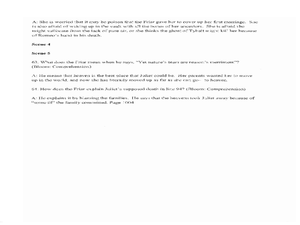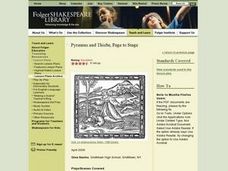Curated OER
Hamlet
Students examine patterns of imagery in Hamlet by using online resources. Students compare the patterns they see to those they've found in other Shakespeare plays. Then students draw conclusions about why Shakespeare might have used the...
Curated OER
King Lear
Students examine patterns of imagery in King Lear by using online resources. Students compare the patterns they see to those they've found in other Shakespeare plays. Then students draw conclusions about why Shakespeare might have used...
Curated OER
"Some Excellent Dumb Discourse:" Caliban as native American
Explore The Tempest and how language and power are intertwined in the play. Through a series of questions (provided) and an intense activity that has groups translate Caliban's speech into American Sign Language, learners recognize...
Curated OER
Boys Will Be Boys...Right?
Through this exercise, high schoolers identify character traits present in Romeo and Juliet. They listen to an excerpt from "The Office of Christian Parents: Showing How Children Are to be Governed" and participate in a Socratic...
Curated OER
Conflict Resolution Lesson Plan
What is a bully? Romeo and Juliet's Act 3 Scene 1 gives eighth and ninth graders the perfect opportunity to explore bullying. After doing some Internet research on bullying characteristics, groups reenact the scene to decide who is the...
EngageNY
Grade 9 ELA Module 1: Unit 3, Lesson 10
"O, I am fortune's fool!" As they continue their analysis of Act 3, scene 1, class members consider the role of fate in the events. The lesson concludes with a viewing of a brief portion of Baz Luhrmann’s Romeo + Juliet, in which the...
EngageNY
Grade 9 ELA Module 1: Unit 3, Lesson 14
After watching the scene from Romeo + Juliet in which Juliet argues with her parents because she does not want to marry Paris, groups do a close reading of Act 4, scene 1, lines 44-88, examining the word choices in the conversation...
EngageNY
Grade 9 ELA Module 1: Unit 3, Lesson 16
"Thus, with a kiss, I die." After viewing a film clip of the events leading up to Romeo's suicide, class members analyze Act 5, scene 3, lines 88-120, in which Romeo drinks the apothecary's poison.
EngageNY
Grade 9 ELA Module 1: Unit 3, Lesson 15
Where does Friar Laurence's loyalty lie? After listening to a reading of Act 4, scene 1, lines 89-126 of Romeo and Juliet, groups examine the details of Friar Laurence's plan.
EngageNY
Grade 9 ELA Module 1: Unit 3, Lesson 17
Romeo and Juliet, Act 5, Scene 3, lines 139-170, is the focus of this day's lesson plan. Readers examine the dramatic irony in Juliet's comments and consider how "lamentable chance" caused by a "greater power" plays a role in the tragedy.
EngageNY
Grade 9 ELA Module 1: Unit 3, Lesson 19
To prepare for the unit's final assessment essay, class members collaborate to find evidence that reveals Romeo and Juliet as tragic heroes.
Teacher Created Materials
The Tragedy of Julius Caesar
Bring Julius Caesar to life with a reader's theatre approach that engages the entire class. The opening exercises model the importance of reading with expression while choral reading exercises permit class members to practice their...
EngageNY
Grade 10 ELA Module 4: Unit 2, Lesson 4
Ambition, murder, nontraditional gender roles ... some problems just can't be fixed in marriage counseling. Learners discuss the relationship between Macbeth and Lady Macbeth. As a culminating activity, pupils analyze how the characters'...
EngageNY
Mid-Unit 2 Assessment: Analyzing Narrative Structure and Author’s Craft: Part 1
Using the resource, scholars complete a mid-unit assessment to gauge their learning at the halfway point of the unit. Pupils read the myth "The Harvest That Never Came" and plot its narrative structure.
EngageNY
Writing an Argument Essay: Planning the Essay
It's time for a quote sandwich! Using the resource, pupils learn about the three parts of an effective quotation: introduction, quote, and analysis. Scholars use the model to peer critique each others' writing to show what they learned.
K20 LEARN
#Unstressed #Stressed: Shakespearean Sonnets And Iambic Pentameter
Does any word rhyme with orange? Young poets try their hand at crafting a Shakespearean sonnet by first creating list of rhyming words. They then examine the use of unstressed and stressed syllables in iambic pentameter and the rhyme...
K20 LEARN
My Love Is Like Figurative Language: Figurative Language in Romeo and Juliet
My love is like an anaconda. Huh? Scholars investigate similes, metaphors, hyperbole, and personification used by writers to express feelings. They examine lyrics from songs and lines from Romeo and Juliet and consider how the use of...
K20 LEARN
Preparing for Othello - Frontloading Meaning (Part 2): Pre-reading Strategies
The second lesson plan in a two-part series that prepares high schoolers for a study of Othello focuses on additional pre-reading strategies. Pupils reflect on what they have learned and consider what they would like to learn about the...
Curated OER
Pyramus and Thisbe, Page to Stage
Students read and interpret a script. Then they use higher order thinking skills to transfer information to long term memory. They use the information and interpretations in order to have a model to create dramatic scripts.
Curated OER
"Such Affection Move": Finding Staging Clues in A Midsummer Night's Dream
Learners perform various scenes from the play, A Midsummer Night's Dream. They examine and discuss the text and stage directions, then perform their scenes in small groups for the class.
Curated OER
Othello's Father of the Bride
Students read and analyze Act one of the play Othello. They examine the themes of love and marriage and interpret Brabantio's words by using different subtexts.
Curated OER
Cracking Cassius
Young scholars examine the argument between Cassius and Brutus to define the importance of friendship and study a Shakespearean play. In this Julius Caesar analysis lesson, students list qualities of a best friend and read scenes from...
Curated OER
Change slander to remorse: Unscripted Scenes
Students hypothesize about the content of unscripted moments, search for evidence in the actual text to support their hypothesis, and explore how this hypothesis would affect characterization.
Curated OER
Like, Wow
Students read Hamlet. They read again and hunt for a word that appears 4 times. They identify the word "like" and define it. Volunteers act out the scene and they discuss the uses of the word like. They discuss the senses and reality in...
Other popular searches
- William Shakespeare
- Shakespeare Sonnets
- Shakespeare in Love
- Rhyming Couplets Shakespeare
- Shakespeare in Love Film
- Shakespeare and Macbeth
- Esl and Shakespeare
- Shakespeare Phrases
- Shakespeare Activity
- Shakespeare Acting
- Shakespeare Julius Caesar
- Shakespeare Lesson Plans

























